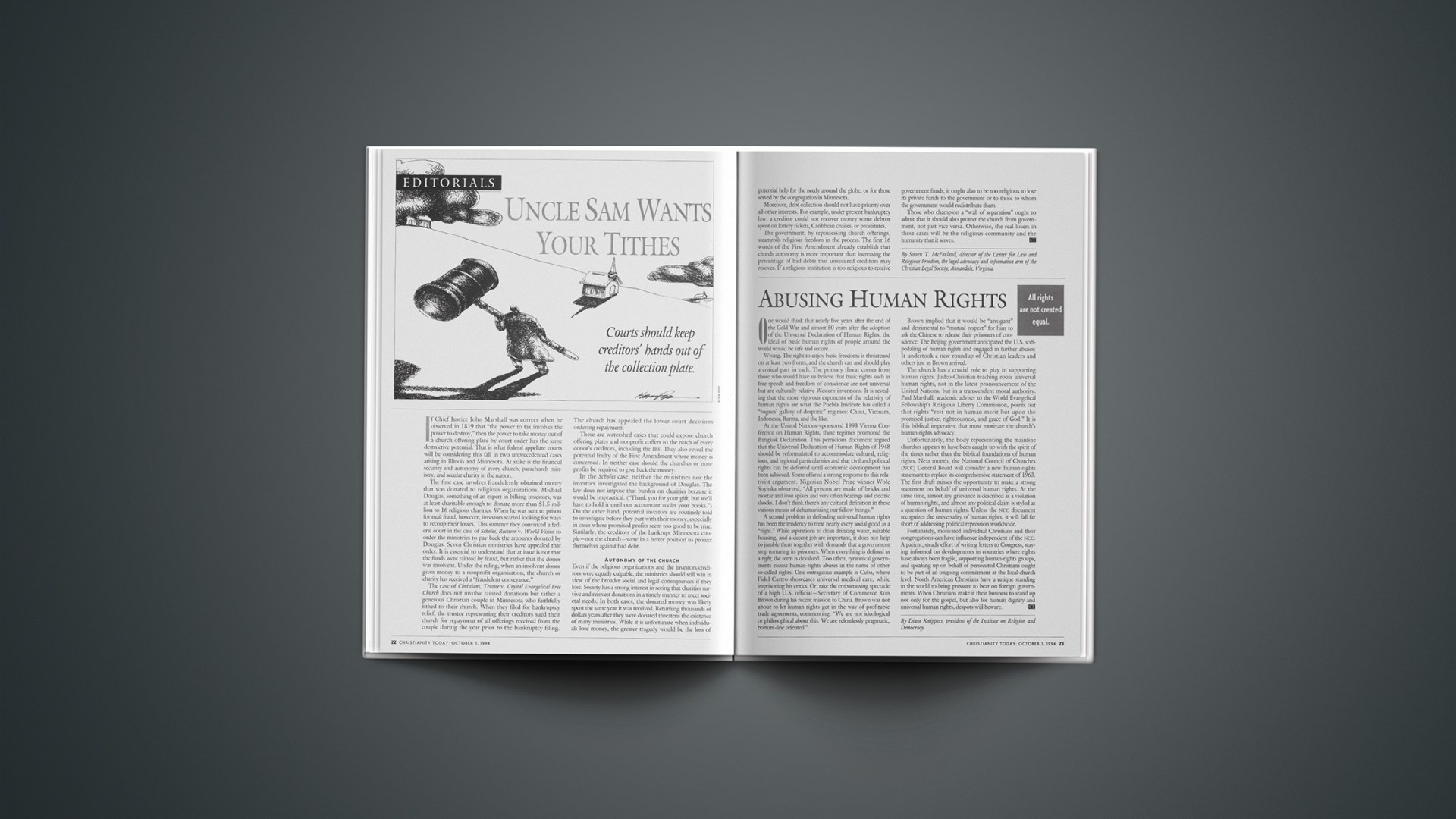One would think that nearly five years after the end of the Cold War and almost 50 years after the adoption of the Universal Declaration of Human Rights, the ideal of basic human rights of people around the world would be safe and secure.
Wrong. The right to enjoy basic freedoms is threatened on at least two fronts, and the church can and should play a critical part in each. The primary threat comes from those who would have us believe that basic rights such as free speech and freedom of conscience are not universal but are culturally relative Western inventions. It is revealing that the most vigorous exponents of the relativity of human rights are what the Puebla Institute has called a “rogues’ gallery of despotic” regimes: China, Vietnam, Indonesia, Burma, and the like.
At the United Nations-sponsored 1993 Vienna Conference on Human Rights, these regimes promoted the Bangkok Declaration. This pernicious document argued that the Universal Declaration of Human Rights of 1948 should be reformulated to accommodate cultural, religious, and region particularities that civil and political rights can be deferred until economic development has been achieved. Some offered a strong response to this relativist argument. Nigerian Nobel Prize winner Wole Soyinka observed, “All prisons are made of bricks and molar and iron spikes and very often beatings and electric shocks. I don’t think there’s any cultural definition in these various means of dehumanizing our fellow beings.”
A second problem in defending university human rights has been the tendency to treat nearly every social good as a “right.” While aspirations to clean driving water, suitable housing, and a decent job are important, it does not help to jumble them together with demands that a government stop touring its prisoners. When everything is defined as a right, the term is devalued. Too often tyrannical governments excuse human-rights abuses in the name of other so-called rights. One outrageous example is Cuba, where Fidel Castro showcases universal medical care, while imprisoning his critics. Or, take the embarrassing spectacle of a high U.S. official—Secretary of Commerce Ron Brown during his recent mission to China. Brown was not about to let human rights get in the way of profitable trade agreements, commenting: “We are not ideological or philosophical about this. We are relentlessly pragmatic, bottom-line oriented.”
Brown implied that it would be “arrogant” and detrimental to “mutual respect” for him to ask the Chinese to release their prisoners of conscience. The Beijing government anticipated the U.S. softpedaling of human rights and engaged in further abuses: It undertook a new roundup of Christian leaders and others just as Brown arrived.
The church has a crucial role to play in supporting human rights. Judeo-Christian teaching roots universal human rights, not in the latest pronouncement of the United Nations, but in a transcendent moral authority. Paul Marshall, academic adviser to the World Evangelical Fellowship’s Religious Liberty Commission, points out that rights “rest not in human merit but upon the promised justice, righteousness, and grace of God.” It is this biblical imperative that must motivate the church’s human-rights advocacy.
Unfortunately, the body representing the mainline churches appears to have been caught up with the spirit of the times rather than the biblical foundations of human rights. Next month, the National Council of Churches (NCC) General Board will consider a new human-rights statement to replace its comprehensive statement of 1963. The first draft misses the opportunity to make a strong statement on behalf of universal human rights. At the same time, almost any grievance is described as a violation of human rights, and almost any political claim is styled as a question of human rights. Unless the NCC document recognizes the universality of human rights, it will fall far short of addressing political repression worldwide.
Fortunately, motivated individual Christians and their congregations can have influence independent of the NCC. A patient, steady effort of writing letters to Congress, staying informed on developments in countries where rights have always been fragile, supporting human-rights groups, and speaking up on behalf of persecuted Christians ought to be part of an ongoing commitment at the local-church level. North American Christians have a unique standing in the world to bring pressure to bear on foreign governments. When Christians make it their business to stand up not only for the gospel, but also for human dignity and universal human rights, despots will beware.
********************
Diane Knippers is president of the Institute on Religion and Democracy.
Copyright © 1994 Christianity Today. Click for reprint information.










